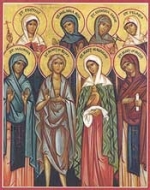By Nuria Calduch-Benages, MN
Flaminia Giovannelli, the first lay women to be appointed under-secretary of the Pontifical Council for Justice and Peace, made the following statement recently for the Osservatore Romano: “There are certain ecclesial areas in which women excel. I am thinking in particular of spiritual direction. If receiving the sacrament of Reconciliation is essential for Christians because it reconciles them with God, spiritual direction is of fundamental importance for their life: to know rationally that sin has been forgiven us is not always equivalent to feeling forgiven. How important is someone’s help in recognising and supporting the plan the Lord has for each one of us. And how often does this help come to us from a woman, precisely because of her own sensitivity and affectivity” (L’Osservatore Romano weekly edition in English, Wed. 4 August 2010).
When I read this, I immediately remembered the amma of the desert, Christian women of the 4th and 5th centuries who founded some of the earliest communities of women so that their wisdom could reach a wider public. Amma, a term used to describe a “spiritual mother”, is the equivalent of abba, the name given to a “spiritual father”. According to Mary Forman, “amma refers to the ability one had to become a spiritual guide for another and is not explicitly associated with the role of abbess or superior”.
The lives of these desert mothers have come to light quite recently, and their biographies and stories are jewels of wisdom that reveal the important role they had in the foundation of monasticism. Their names are Mary of Egypt, Sarah, Theodora, Syncletica, Melanie, Pachomius’ sister Mary, Gregory of Nyssa’s sister Macrina, and many others. They were women of wisdom, bearers of the Spirit and Scripture scholars. These amma of the desert placed their qualities and gifts at the service of others. They were in love with God, the desert and prayer, and they proved to be authentic spiritual guides for everyone, men and women, who felt this need.
The women of today have been bequeathed this heritage, a heritage that we should preserve because it is part of our history as well as a stimulus for the future.






